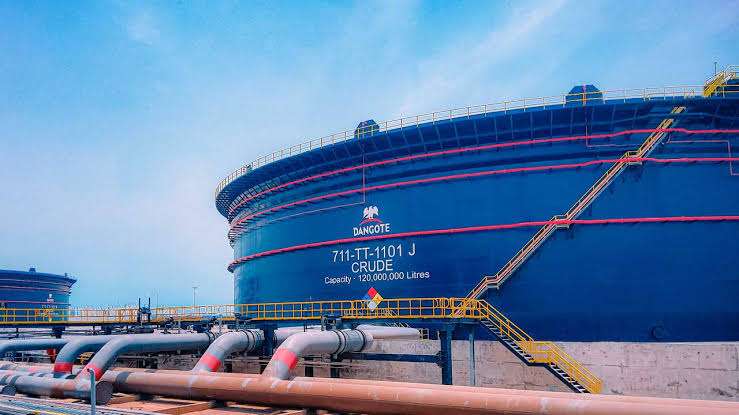Business
FG moves to avert crisis as PENGASSAN shuts operations amid war with Dangote

The federal government is taking frantic steps to avert an energy crisis as nationwide strike by Petroleum and Natural Gas Senior Staff Association of Nigeria (PENGASSAN) scheduled to begin today, threatens to cripple Nigeria’s oil and gas industry.
This is as the standoff between PENGASSAN and the management of Dangote Petroleum Refinery continues to intensify.
The dispute, which escalated over alleged mass sack of Nigerian workers and their replacement with expatriates, particularly Indians, has already led to the withdrawal of services by PENGASSAN members across the sector.
The union directed its affiliates to shut down crude oil lifting terminals, logistics bases, oil and gas platforms, and even the Nigeria Liquefied Natural Gas operations, beginning from early morning.
Reports from the field confirmed widespread compliance with the directive it was gathered, raising fears of supply disruptions that could cost Nigeria billions of naira in lost revenues and exacerbate the hardship already facing ordinary Nigerians.
The Minister of Labour and Employment, Muhammad Maigari Dingyadi, on Sunday stepped in, appealing to PENGASSAN to suspend the strike and announcing an emergency conciliation meeting scheduled for today in Abuja. The minister warned that the strike, if allowed to continue, would inflict avoidable damage on the economy and urged both sides to embrace dialogue in resolving their grievances.
PENGASSAN, however, maintained a hard line, insisting that the unconditional recall of more than 800 sacked members was the only acceptable resolution. According to the union, many of those dismissed were highly skilled engineers and operators who have now been replaced by expatriates.
General Secretary Lumumba Okugbawa accused Dangote Refinery of victimising Nigerian workers and treating them as expendable, adding that the refinery’s actions, if allowed to stand, would set a dangerous precedent for the oil and gas industry. “We cannot fold our arms while Nigerians are thrown out of their jobs and replaced by foreigners. This is an attack on our sovereignty and a threat to the dignity of Nigerian workers,” he said.
The Trade Union Congress (TUC), the umbrella body of senior workers’ unions, declared full support for PENGASSAN and put all its affiliates on red alert in anticipation of a protracted showdown. TUC insisted that all affected workers must be reinstated and described the refinery’s handling of industrial relations as provocative and insensitive.
Dangote Refinery, on its part, hit back at the union in strong terms, accusing PENGASSAN of decades-long sabotage of the country’s oil and gas sector.
In a statement seen by the New Diplomat on Sunday, the company described the strike order as reckless, lawless, and dangerous, recalling how both PENGASSAN and the National Union of Petroleum and Natural Gas Workers (NUPENG) frustrated the 2007 sale of moribund state-owned refineries to a Dangote-led consortium. The company also cited the union’s silence during the repeated failures of the Port Harcourt refinery rehabilitation project as evidence that PENGASSAN had often acted against the national interest.
The refinery said PENGASSAN was “weaponising hardship against 230 million Nigerians in the name of unionism” and urged the government and security agencies to protect the refinery from what it called sabotage. It further challenged the union to publish audited accounts of the billions it collects in check-off dues from members and to present a list of corporate social responsibility activities it had undertaken in the past decade.
The Nigerian Upstream Petroleum Regulatory Commission (NUPRC) also weighed in, calling for restraint and dialogue, while warning that sustained disruption of oil and gas operations could destabilise energy supply and have ripple effects across the economy.
Separately, a civil society group, the Concerned Nigerian Consumers Forum, accused PENGASSAN of plotting to undermine the refinery, warning that failure of the facility would only benefit fuel importers and rent-seekers who profit from chaos in the downstream sector. “Who benefits if the refinery fails? Certainly not the Nigerian people,” the forum said.





